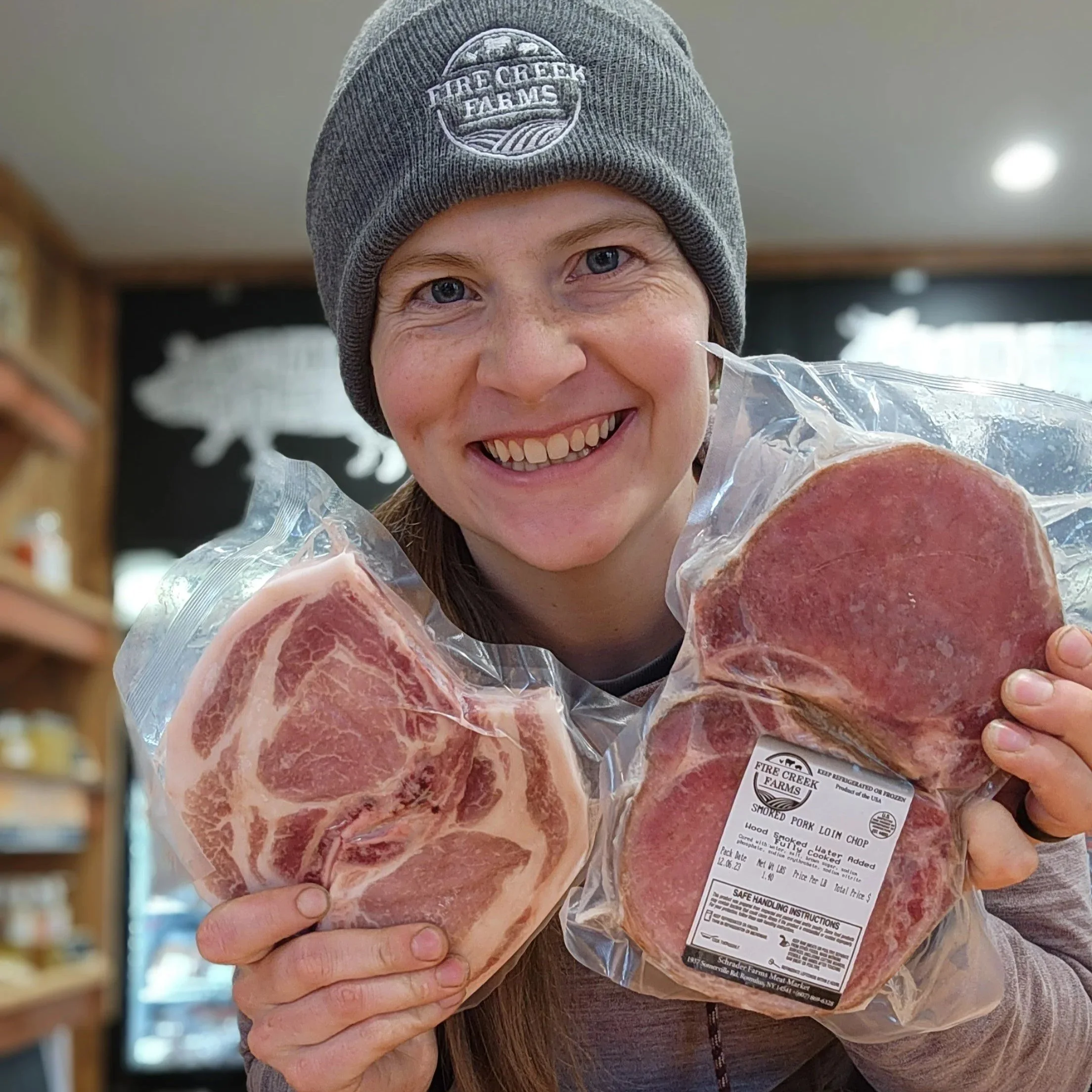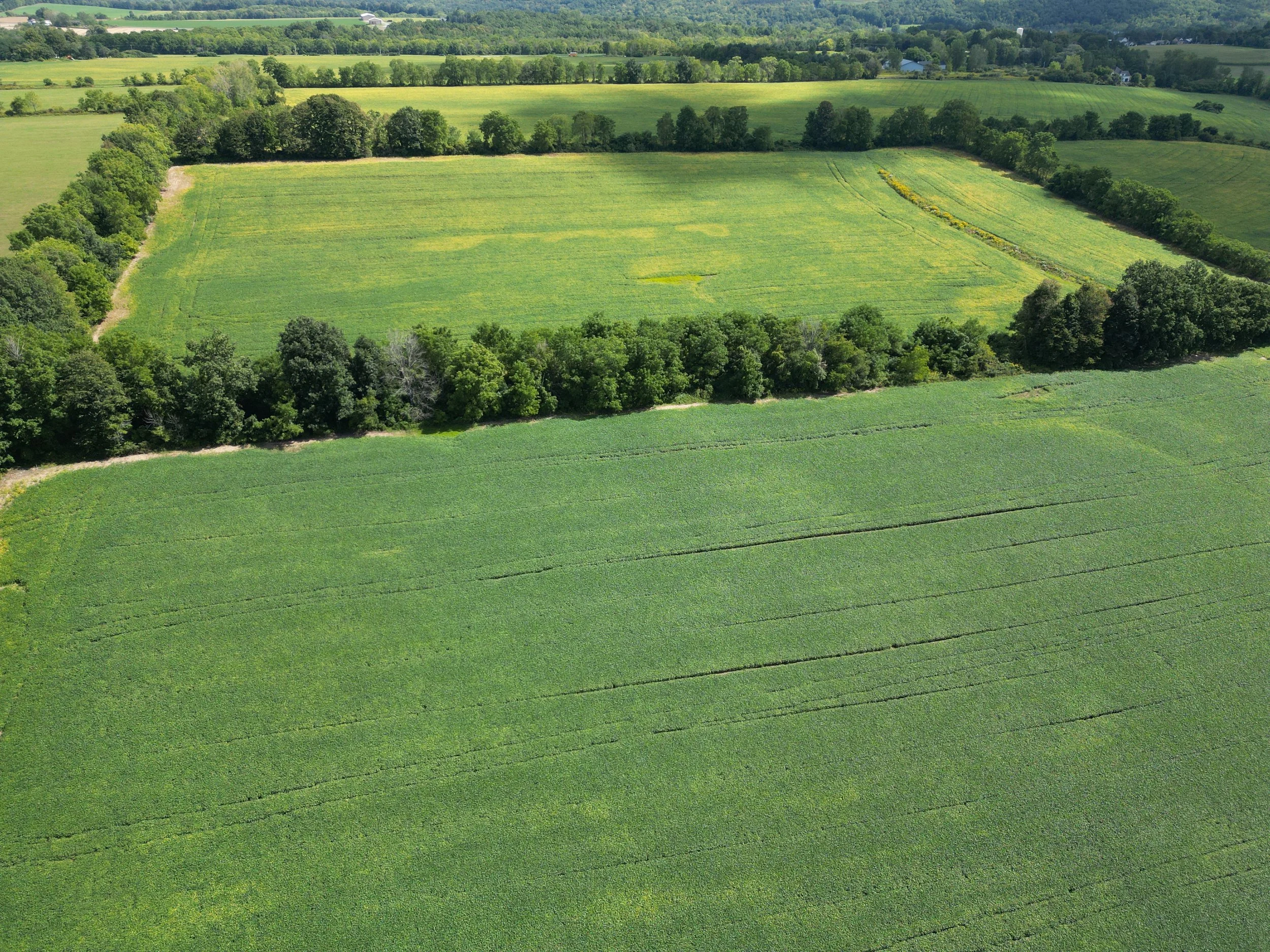Stevens Family Protects First Generation Farm in Livonia
The Stevens family has completed a conservation project with Genesee Valley Conservancy, protecting 276 acres of their first-generation farm in Livonia, Livingston County, NY.
Fire Creek Farms was established in 2015 by Jakob and Kyli Stevens. At the time, Kyli was teaching full-time and Jakob was working on other farms in the community. They decided it was time to set out on their own journey by starting to farm for themselves. While Fire Creek Farms is a first-generation operation, Jakob brought his experience of working for several other farms to their operation, while Kyli comes from a 7th-generation farm family and has farming in her veins.
They started the business by relying on rented acreage at first. For a new start-up, this was their only option as they did not have the capital or collateral to secure loans that would allow for purchasing land. The cash outlay of renting ground was a significant cost, straining their ability to invest in equipment and other needs of the operation. Renting was also not helping the Stevens build equity. This lack of control over acreage posed a long-term business challenge as they could easily lose access to their operations most important asset: the land.
The farm’s original operation began on 10 acres with a small herd of livestock they began raising for beef. By 2017, more ground was rented and they began growing hay for area farms. Two years later, they opened the farm store on Route 15A to sell direct-to-consumer goods complimented by a Community Supported Agriculture (CSA) model where consumers purchase farm shares up-front and then receive weekly ‘dividends’ throughout the growing year. From this stand they began selling their meats, vegetables, herbs and other farm products.
This three-pronged model was a strategic move by the Stevens to create a business that could better weather the unpredictability of agriculture. Weather and pests can impact certain crops in any given year or a trade war could send the price of commodity crops plummeting. By selling pasture raised beef and pork, traditional commodity crops like hay and soybeans, and vegetables direct to consumers, the Stevens have various revenue streams across different products that result in a more predictable business upon which their family can rely.
As Fire Creek Farms became established, Jakob and Kyli had the opportunity and ability to buy ground, increasing their prospects of long-term security for the family. While still faced with the monthly payments for this mortgaged land, they were able to start gaining equity in their land instead of paying rent out the door.
As time progressed, Kyli was able to leave her teaching job to join the farm full-time as it continued to mature.
With the purchase of land, and the long-term plan to continue to acquire more, the Stevens began looking for options to help financially give their farm a boost.
Through the Livingston County Farmland Protection Program, the Stevens applied their ground to see if they would qualify for selling a conservation easement as part of the State’s effort to ensure high quality farmland remains open and available for farming and is not lost to development and converted to non-agricultural uses.
Not only did their farmland qualify, it was a top ranked applicant to the County, allowing Genesee Valley Conservancy to pursue grant funding from New York State Agriculture and Markets to purchase two conservation easements on their first 276 acres of owned ground.
The sale of these easements allowed the Stevens to receive a payment to extinguishing the development rights, thereby ensuring the land remains available only for farming into the future. The income received from this sale was used by the Stevens to pay off one mortgage completely – eliminating a monthly expense from their business – as well as pay down a portion of a second mortgage – giving them a better income to debt ratio so they have the flexibility to mortgage ground to purchase more land if it becomes available or maintain a better cash flow for the business.
The sale of development rights is determined by an appraisal process, where comparable sales of protected and unprotected lands are used to calculate the development value of a farm. The funding grant from New York State will pay a landowner 87.5% of that value, ensuring landowners are committed to their farmland protection project and willing to invest some of their lands value to ensure it is permanently protected.
Today, the Stevens own around 400 acres and are renting an additional 700 acres. In addition to balancing farm economics, Jakob and Kyli are committed to being better stewards of the land. They have converted to no-till farming to allow for better soil structure and health of their fields. This has increased the organic matter over time, reduced erosion, and helped increase their productivity and bottom-line.
The farmland protected by this project includes over 72% USDA Prime soils and 17% State Important soils, which helps the farm produce high yields and was one of the standout features making this an important farmland protection project for Genesee Valley Conservancy.
Over 1.6 miles of scenic road frontage are protected as part of this project, which will remain as intact vistas of the rural, agricultural landscape that defines Livonia’s character and that of the broader Livingston County.
This conservation project involved accepting the 2nd and 3rd conservation easements in the town of Livonia by the Conservancy and is the first farmland protection project in the Town.
This project was the result of a collaboration between Genesee Valley Conservancy, Livingston County Board of Supervisors, Livingston County Agricultural and Farmland Protection Board, Town of Livonia and New York State Department of Agriculture and Markets.
To-date, the farmland protection program of Genesee Valley Conservancy has resulted in over $45 million being invested in protecting 24,538 acres of some of the State’s most productive agricultural lands, right here in the Genesee Valley.
Genesee Valley Conservancy works throughout the Genesee River watershed to protect high quality habitat, open space and farmland for the community. The Conservancy now oversees the protection of 35,337 acres.
Landowners in the Genesee River watershed interested in pursuing conservation options for their property, be it farmland, habitat, or a potential public nature preserve, should contact Genesee Valley Conservancy for more information.
###
Genesee Valley Conservancy is a nationally accredited non-profit conservation organization working to protect the habitat, open space and farmland in the Genesee River watershed. Over 35,337 acres of natural habitat and productive farm and forest land have been conserved by Genesee Valley Conservancy in partnership with private landowners. The organization also owns nature preserves open to the public for recreation and education. For more information visit www.geneseevalleyconservancy.org






